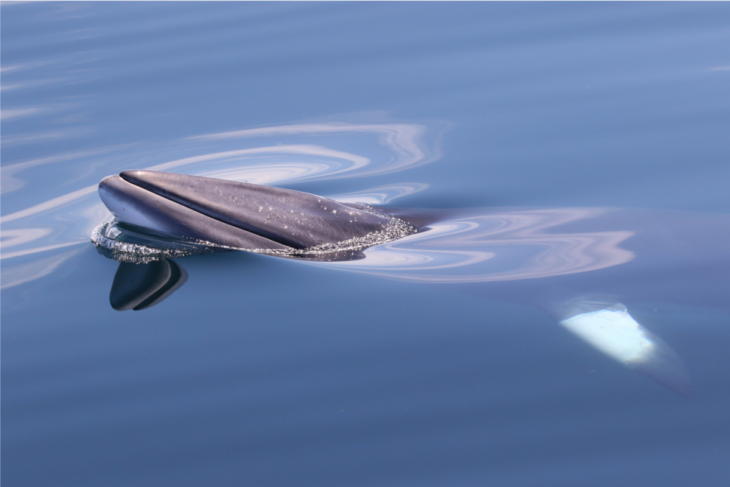The survey team at Sea Watch Foundation, a national charity working to protect marine wildlife, were treated to an amazing minke whale sighting on 20 June, exactly one year after the first reported minke whale sighting in the bay in a decade.
The team was conducting a line transect survey, scientifically measuring the abundance and distribution of marine species. The survey was conducted by a team of volunteer researchers from Sea Watch Foundation, led by Monitoring Officer, Katrin Lohrengel, whilst aboard their recommended boat operator, Dolphin Spotting Boat Trips.
Roughly 8 nautical miles off the coast of Cardigan, within Cardigan Bay Special Area of Conservation, Katrin spotted an animal surfacing in front of the boat. On the second surfacing, it quickly became apparent that this was not a dolphin.

Minke whales are one of the smaller baleen whale species, growing up to 8.6m. They have a pointed head and a body that is dark grey to black, with grey areas on the flanks. Their characteristic white flipper bands make them easy to distinguish from other baleen whale species.
Katrin stated:
“Minke whale sightings are so rare for us, we were simply not expecting it, certainly not on the anniversary of our last sighting! We stopped the boat and cut the engines, hoping we’d have at least another glimpse of it when it surfaced again.”
But this is when the encounter took an unexpected turn, rather than continuing on its direction of travel, the whale surfaced immediately behind the boat and swam slowly underneath it, close enough for the delighted survey team to follow its every move under the water. It continued to circle the boat for approximately 10 minutes before moving off.
“It felt unreal. All whale sightings are special, of course, but to be able to observe one at such close range on its own terms was simply amazing. We could not believe our luck!”
Prof. Peter Evans, the Sea Watch Foundation director, commented:
“Minke whales can be very curious around boats. We’ve often had encounters like this in the Hebrides but never in Wales so it was a wonderful experience for all involved!”
“Over the past few weeks we have had some incredible wildlife encounters in Cardigan Bay, including Risso’s dolphins and hundreds of common dolphins which highlights the diversity of species that use this area and the importance of the Sea Watch Foundation’s continued survey work in the two Welsh Special Areas of Conservation.”
If you spot a whale, dolphin or porpoise, you can report it to the Sea Watch Foundation either via their website or Sea Watcher app and contribute to the ongoing monitoring work. If you would like to learn more about UK cetaceans and get actively involved, find out more on how to take part in Sea Watch Foundation’s nationwide event: National Whale and Dolphin Watch.
